Business Communication Report: Academic Integrity, Models and Success
VerifiedAdded on 2022/09/22
|6
|1220
|18
Report
AI Summary
This report delves into various aspects of business communication, commencing with a discussion on academic integrity, emphasizing its significance in building trust and upholding ethical standards. It then explores individual learning styles, specifically focusing on the converging learning style and its implications for academic success. The report further examines the importance of time management and critical thinking skills for students. The core of the report analyzes different models of business communication, including linear, transactional, and interactive models, highlighting their strengths and weaknesses within an organizational context. It also addresses the challenges of effective communication in the digital age, especially the importance of face-to-face communication in certain situations, and provides a comprehensive overview of effective communication strategies. The report is well-researched and includes proper referencing.
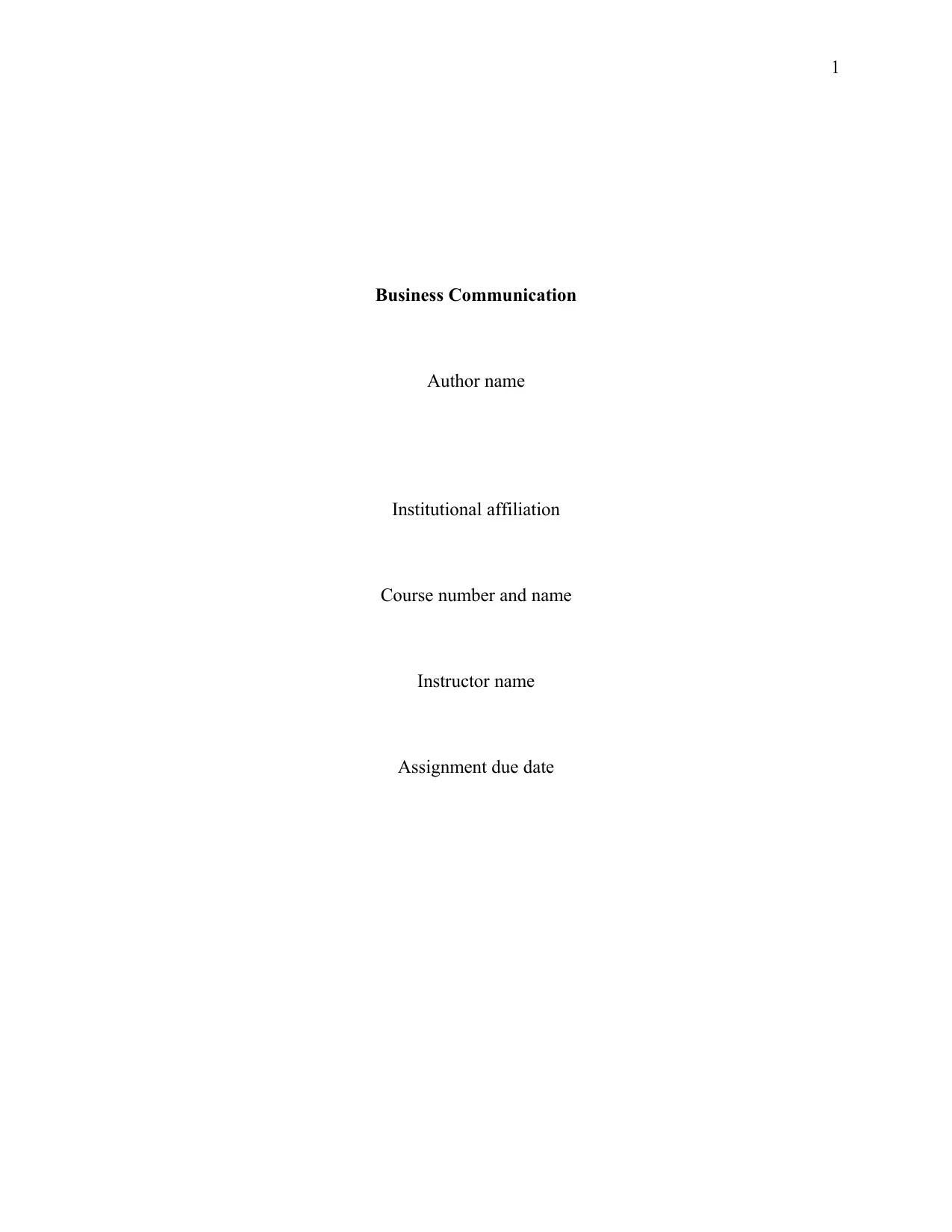
1
Business Communication
Author name
Institutional affiliation
Course number and name
Instructor name
Assignment due date
Business Communication
Author name
Institutional affiliation
Course number and name
Instructor name
Assignment due date
Paraphrase This Document
Need a fresh take? Get an instant paraphrase of this document with our AI Paraphraser
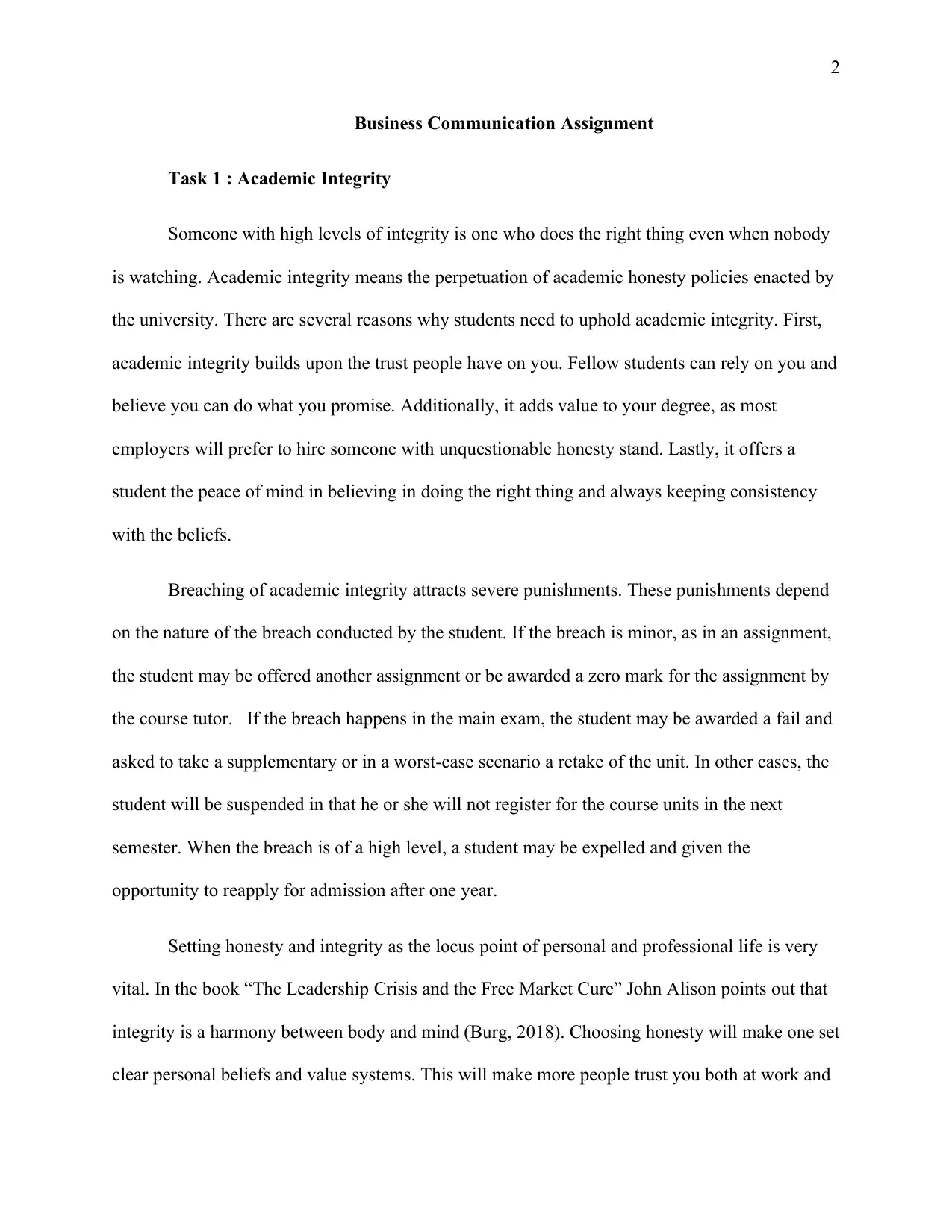
2
Business Communication Assignment
Task 1 : Academic Integrity
Someone with high levels of integrity is one who does the right thing even when nobody
is watching. Academic integrity means the perpetuation of academic honesty policies enacted by
the university. There are several reasons why students need to uphold academic integrity. First,
academic integrity builds upon the trust people have on you. Fellow students can rely on you and
believe you can do what you promise. Additionally, it adds value to your degree, as most
employers will prefer to hire someone with unquestionable honesty stand. Lastly, it offers a
student the peace of mind in believing in doing the right thing and always keeping consistency
with the beliefs.
Breaching of academic integrity attracts severe punishments. These punishments depend
on the nature of the breach conducted by the student. If the breach is minor, as in an assignment,
the student may be offered another assignment or be awarded a zero mark for the assignment by
the course tutor. If the breach happens in the main exam, the student may be awarded a fail and
asked to take a supplementary or in a worst-case scenario a retake of the unit. In other cases, the
student will be suspended in that he or she will not register for the course units in the next
semester. When the breach is of a high level, a student may be expelled and given the
opportunity to reapply for admission after one year.
Setting honesty and integrity as the locus point of personal and professional life is very
vital. In the book “The Leadership Crisis and the Free Market Cure” John Alison points out that
integrity is a harmony between body and mind (Burg, 2018). Choosing honesty will make one set
clear personal beliefs and value systems. This will make more people trust you both at work and
Business Communication Assignment
Task 1 : Academic Integrity
Someone with high levels of integrity is one who does the right thing even when nobody
is watching. Academic integrity means the perpetuation of academic honesty policies enacted by
the university. There are several reasons why students need to uphold academic integrity. First,
academic integrity builds upon the trust people have on you. Fellow students can rely on you and
believe you can do what you promise. Additionally, it adds value to your degree, as most
employers will prefer to hire someone with unquestionable honesty stand. Lastly, it offers a
student the peace of mind in believing in doing the right thing and always keeping consistency
with the beliefs.
Breaching of academic integrity attracts severe punishments. These punishments depend
on the nature of the breach conducted by the student. If the breach is minor, as in an assignment,
the student may be offered another assignment or be awarded a zero mark for the assignment by
the course tutor. If the breach happens in the main exam, the student may be awarded a fail and
asked to take a supplementary or in a worst-case scenario a retake of the unit. In other cases, the
student will be suspended in that he or she will not register for the course units in the next
semester. When the breach is of a high level, a student may be expelled and given the
opportunity to reapply for admission after one year.
Setting honesty and integrity as the locus point of personal and professional life is very
vital. In the book “The Leadership Crisis and the Free Market Cure” John Alison points out that
integrity is a harmony between body and mind (Burg, 2018). Choosing honesty will make one set
clear personal beliefs and value systems. This will make more people trust you both at work and
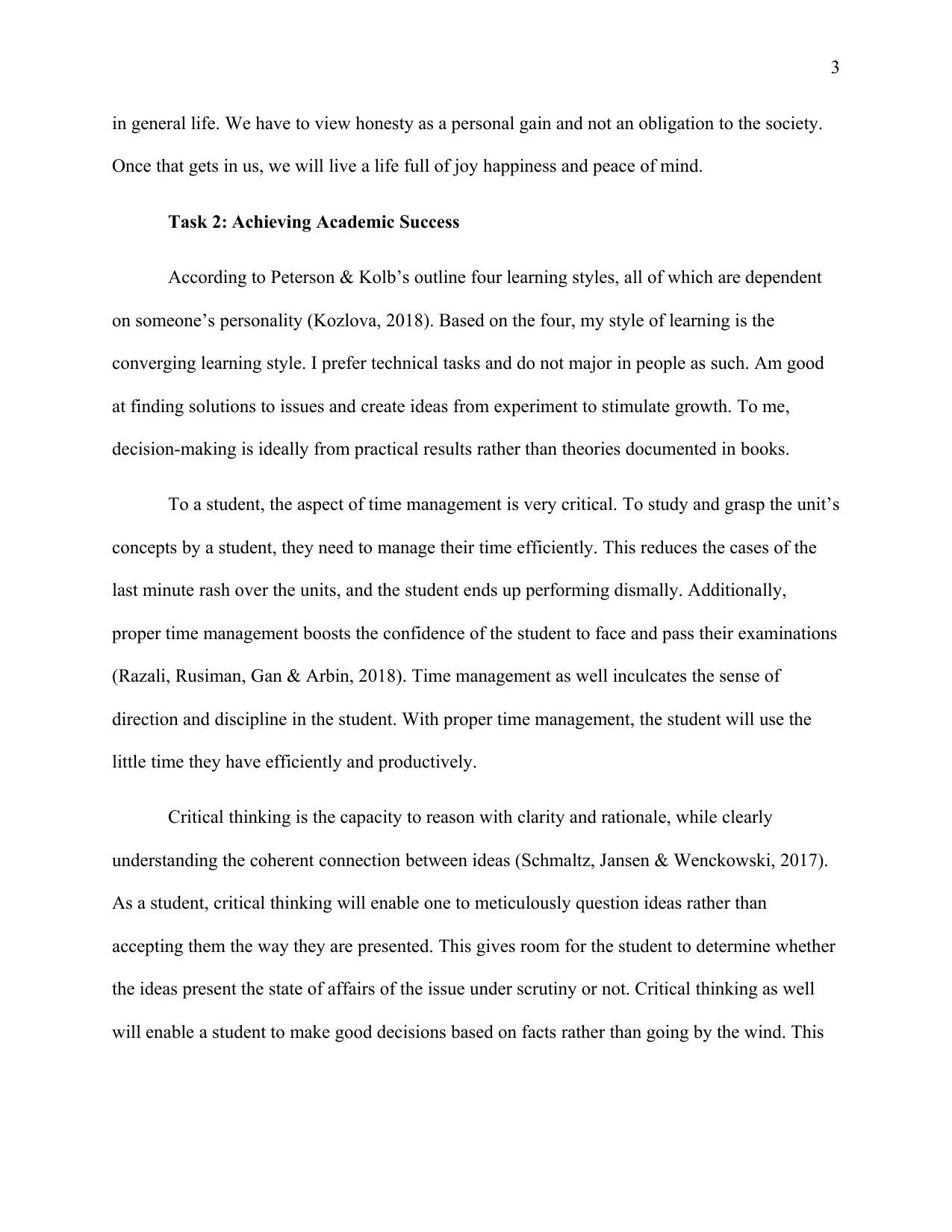
3
in general life. We have to view honesty as a personal gain and not an obligation to the society.
Once that gets in us, we will live a life full of joy happiness and peace of mind.
Task 2: Achieving Academic Success
According to Peterson & Kolb’s outline four learning styles, all of which are dependent
on someone’s personality (Kozlova, 2018). Based on the four, my style of learning is the
converging learning style. I prefer technical tasks and do not major in people as such. Am good
at finding solutions to issues and create ideas from experiment to stimulate growth. To me,
decision-making is ideally from practical results rather than theories documented in books.
To a student, the aspect of time management is very critical. To study and grasp the unit’s
concepts by a student, they need to manage their time efficiently. This reduces the cases of the
last minute rash over the units, and the student ends up performing dismally. Additionally,
proper time management boosts the confidence of the student to face and pass their examinations
(Razali, Rusiman, Gan & Arbin, 2018). Time management as well inculcates the sense of
direction and discipline in the student. With proper time management, the student will use the
little time they have efficiently and productively.
Critical thinking is the capacity to reason with clarity and rationale, while clearly
understanding the coherent connection between ideas (Schmaltz, Jansen & Wenckowski, 2017).
As a student, critical thinking will enable one to meticulously question ideas rather than
accepting them the way they are presented. This gives room for the student to determine whether
the ideas present the state of affairs of the issue under scrutiny or not. Critical thinking as well
will enable a student to make good decisions based on facts rather than going by the wind. This
in general life. We have to view honesty as a personal gain and not an obligation to the society.
Once that gets in us, we will live a life full of joy happiness and peace of mind.
Task 2: Achieving Academic Success
According to Peterson & Kolb’s outline four learning styles, all of which are dependent
on someone’s personality (Kozlova, 2018). Based on the four, my style of learning is the
converging learning style. I prefer technical tasks and do not major in people as such. Am good
at finding solutions to issues and create ideas from experiment to stimulate growth. To me,
decision-making is ideally from practical results rather than theories documented in books.
To a student, the aspect of time management is very critical. To study and grasp the unit’s
concepts by a student, they need to manage their time efficiently. This reduces the cases of the
last minute rash over the units, and the student ends up performing dismally. Additionally,
proper time management boosts the confidence of the student to face and pass their examinations
(Razali, Rusiman, Gan & Arbin, 2018). Time management as well inculcates the sense of
direction and discipline in the student. With proper time management, the student will use the
little time they have efficiently and productively.
Critical thinking is the capacity to reason with clarity and rationale, while clearly
understanding the coherent connection between ideas (Schmaltz, Jansen & Wenckowski, 2017).
As a student, critical thinking will enable one to meticulously question ideas rather than
accepting them the way they are presented. This gives room for the student to determine whether
the ideas present the state of affairs of the issue under scrutiny or not. Critical thinking as well
will enable a student to make good decisions based on facts rather than going by the wind. This
⊘ This is a preview!⊘
Do you want full access?
Subscribe today to unlock all pages.

Trusted by 1+ million students worldwide
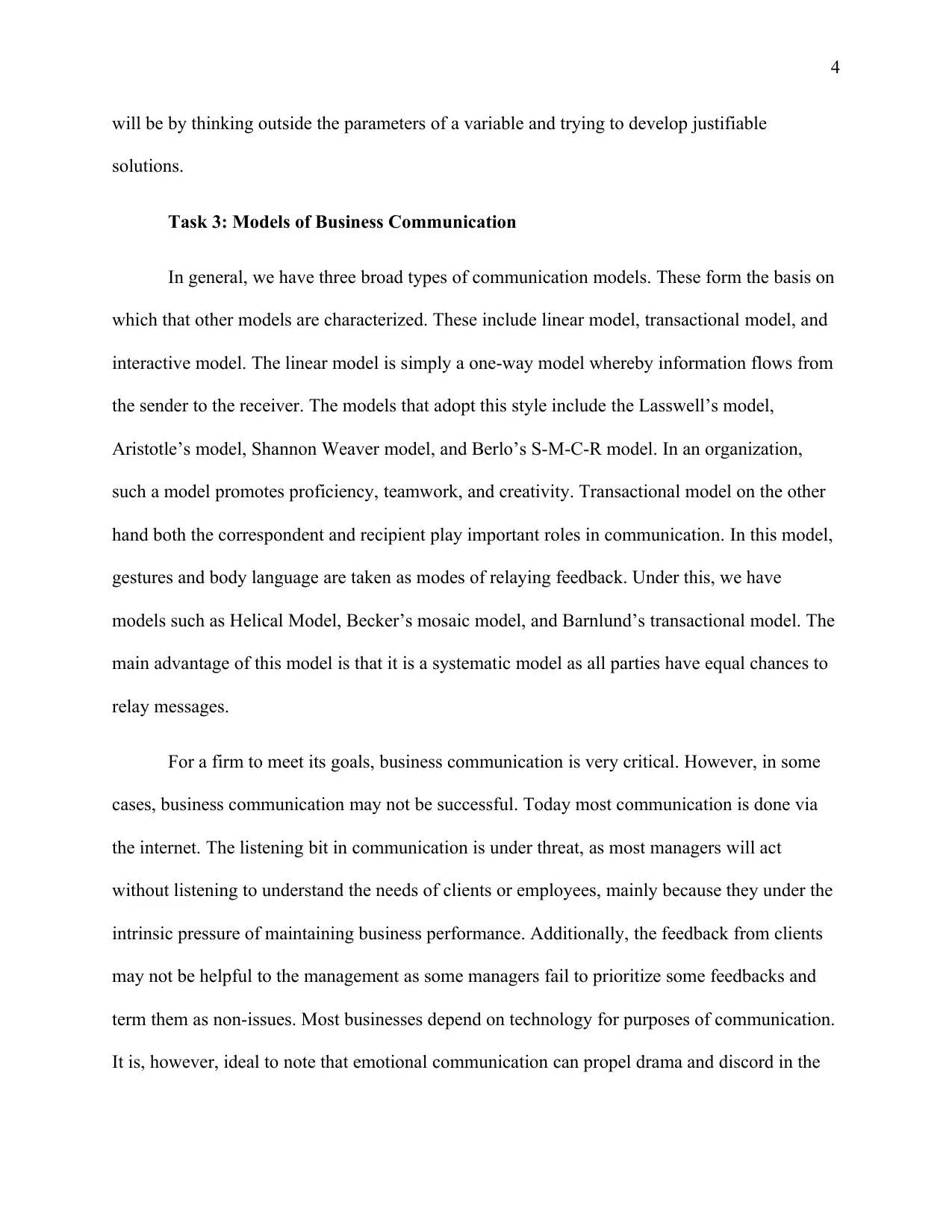
4
will be by thinking outside the parameters of a variable and trying to develop justifiable
solutions.
Task 3: Models of Business Communication
In general, we have three broad types of communication models. These form the basis on
which that other models are characterized. These include linear model, transactional model, and
interactive model. The linear model is simply a one-way model whereby information flows from
the sender to the receiver. The models that adopt this style include the Lasswell’s model,
Aristotle’s model, Shannon Weaver model, and Berlo’s S-M-C-R model. In an organization,
such a model promotes proficiency, teamwork, and creativity. Transactional model on the other
hand both the correspondent and recipient play important roles in communication. In this model,
gestures and body language are taken as modes of relaying feedback. Under this, we have
models such as Helical Model, Becker’s mosaic model, and Barnlund’s transactional model. The
main advantage of this model is that it is a systematic model as all parties have equal chances to
relay messages.
For a firm to meet its goals, business communication is very critical. However, in some
cases, business communication may not be successful. Today most communication is done via
the internet. The listening bit in communication is under threat, as most managers will act
without listening to understand the needs of clients or employees, mainly because they under the
intrinsic pressure of maintaining business performance. Additionally, the feedback from clients
may not be helpful to the management as some managers fail to prioritize some feedbacks and
term them as non-issues. Most businesses depend on technology for purposes of communication.
It is, however, ideal to note that emotional communication can propel drama and discord in the
will be by thinking outside the parameters of a variable and trying to develop justifiable
solutions.
Task 3: Models of Business Communication
In general, we have three broad types of communication models. These form the basis on
which that other models are characterized. These include linear model, transactional model, and
interactive model. The linear model is simply a one-way model whereby information flows from
the sender to the receiver. The models that adopt this style include the Lasswell’s model,
Aristotle’s model, Shannon Weaver model, and Berlo’s S-M-C-R model. In an organization,
such a model promotes proficiency, teamwork, and creativity. Transactional model on the other
hand both the correspondent and recipient play important roles in communication. In this model,
gestures and body language are taken as modes of relaying feedback. Under this, we have
models such as Helical Model, Becker’s mosaic model, and Barnlund’s transactional model. The
main advantage of this model is that it is a systematic model as all parties have equal chances to
relay messages.
For a firm to meet its goals, business communication is very critical. However, in some
cases, business communication may not be successful. Today most communication is done via
the internet. The listening bit in communication is under threat, as most managers will act
without listening to understand the needs of clients or employees, mainly because they under the
intrinsic pressure of maintaining business performance. Additionally, the feedback from clients
may not be helpful to the management as some managers fail to prioritize some feedbacks and
term them as non-issues. Most businesses depend on technology for purposes of communication.
It is, however, ideal to note that emotional communication can propel drama and discord in the
Paraphrase This Document
Need a fresh take? Get an instant paraphrase of this document with our AI Paraphraser
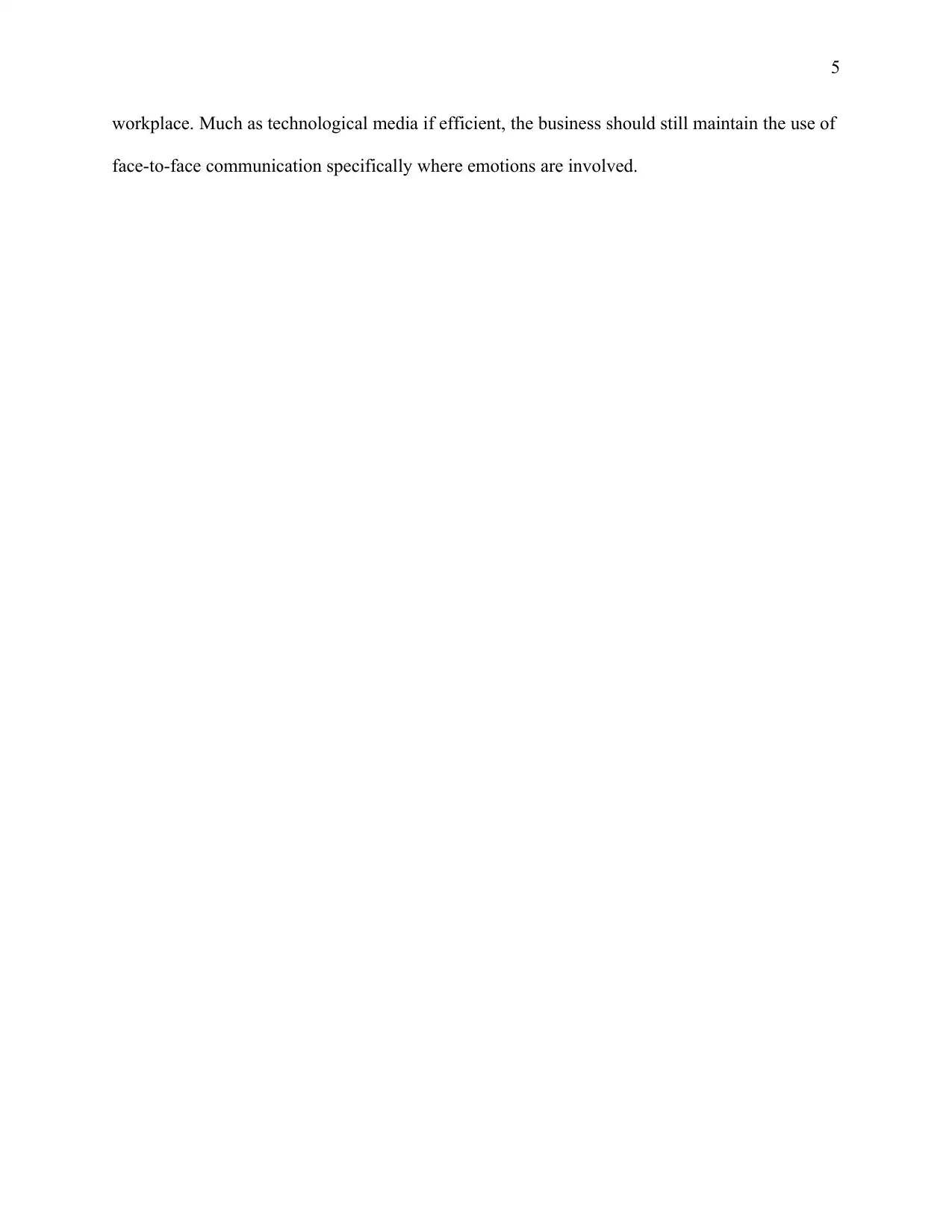
5
workplace. Much as technological media if efficient, the business should still maintain the use of
face-to-face communication specifically where emotions are involved.
workplace. Much as technological media if efficient, the business should still maintain the use of
face-to-face communication specifically where emotions are involved.
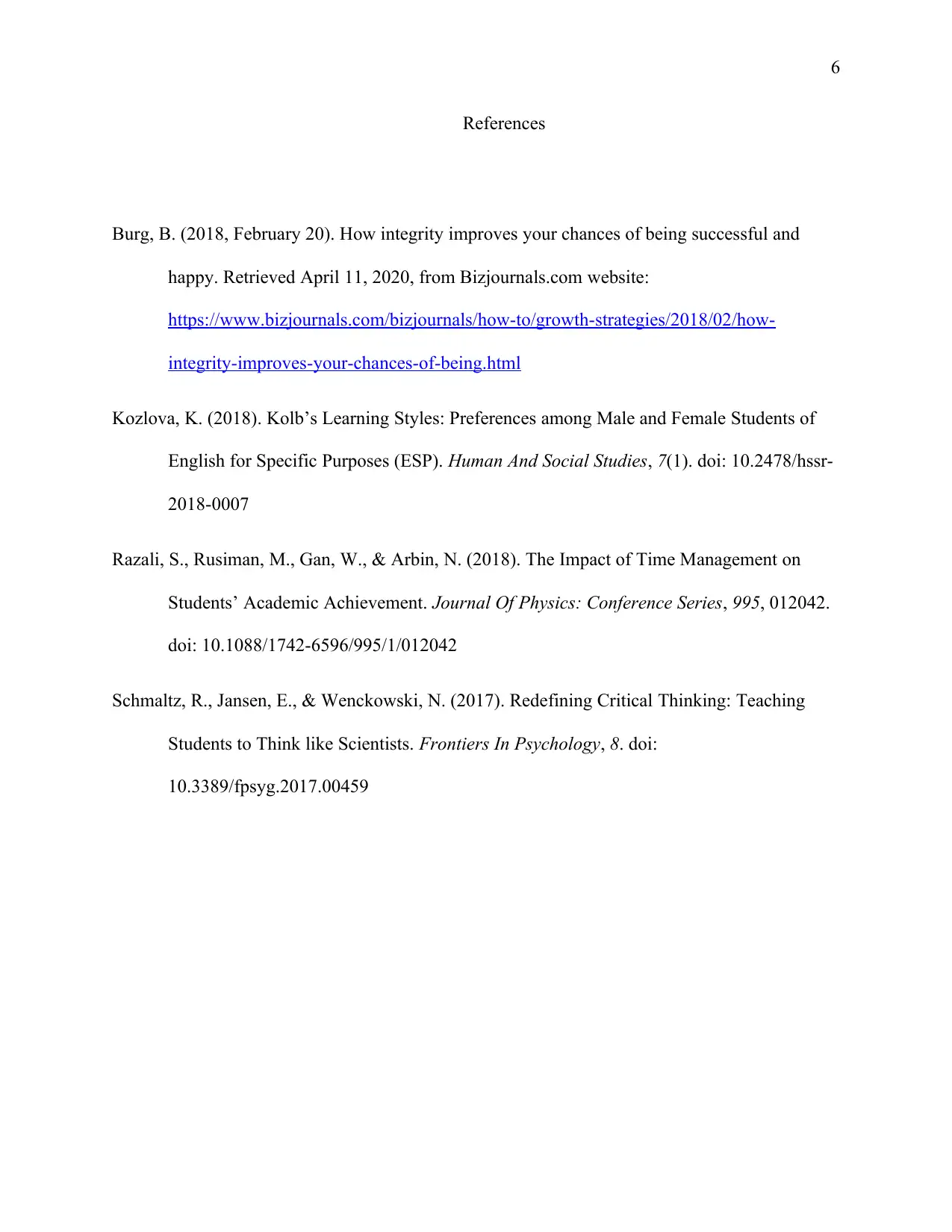
6
References
Burg, B. (2018, February 20). How integrity improves your chances of being successful and
happy. Retrieved April 11, 2020, from Bizjournals.com website:
https://www.bizjournals.com/bizjournals/how-to/growth-strategies/2018/02/how-
integrity-improves-your-chances-of-being.html
Kozlova, K. (2018). Kolb’s Learning Styles: Preferences among Male and Female Students of
English for Specific Purposes (ESP). Human And Social Studies, 7(1). doi: 10.2478/hssr-
2018-0007
Razali, S., Rusiman, M., Gan, W., & Arbin, N. (2018). The Impact of Time Management on
Students’ Academic Achievement. Journal Of Physics: Conference Series, 995, 012042.
doi: 10.1088/1742-6596/995/1/012042
Schmaltz, R., Jansen, E., & Wenckowski, N. (2017). Redefining Critical Thinking: Teaching
Students to Think like Scientists. Frontiers In Psychology, 8. doi:
10.3389/fpsyg.2017.00459
References
Burg, B. (2018, February 20). How integrity improves your chances of being successful and
happy. Retrieved April 11, 2020, from Bizjournals.com website:
https://www.bizjournals.com/bizjournals/how-to/growth-strategies/2018/02/how-
integrity-improves-your-chances-of-being.html
Kozlova, K. (2018). Kolb’s Learning Styles: Preferences among Male and Female Students of
English for Specific Purposes (ESP). Human And Social Studies, 7(1). doi: 10.2478/hssr-
2018-0007
Razali, S., Rusiman, M., Gan, W., & Arbin, N. (2018). The Impact of Time Management on
Students’ Academic Achievement. Journal Of Physics: Conference Series, 995, 012042.
doi: 10.1088/1742-6596/995/1/012042
Schmaltz, R., Jansen, E., & Wenckowski, N. (2017). Redefining Critical Thinking: Teaching
Students to Think like Scientists. Frontiers In Psychology, 8. doi:
10.3389/fpsyg.2017.00459
⊘ This is a preview!⊘
Do you want full access?
Subscribe today to unlock all pages.

Trusted by 1+ million students worldwide
1 out of 6
Related Documents
Your All-in-One AI-Powered Toolkit for Academic Success.
+13062052269
info@desklib.com
Available 24*7 on WhatsApp / Email
![[object Object]](/_next/static/media/star-bottom.7253800d.svg)
Unlock your academic potential
Copyright © 2020–2026 A2Z Services. All Rights Reserved. Developed and managed by ZUCOL.





